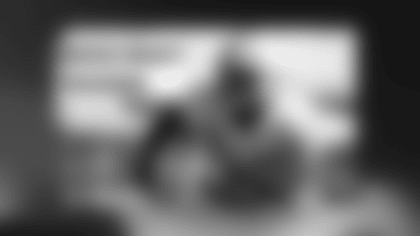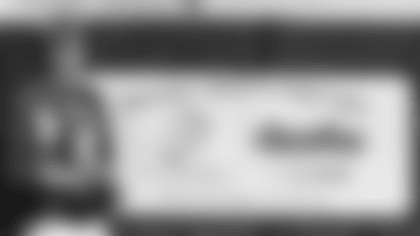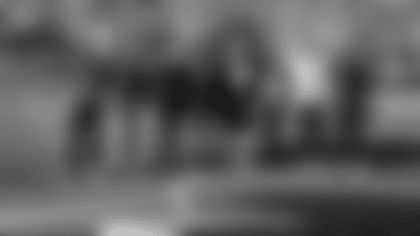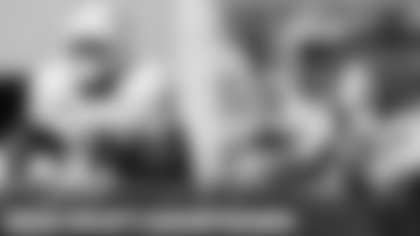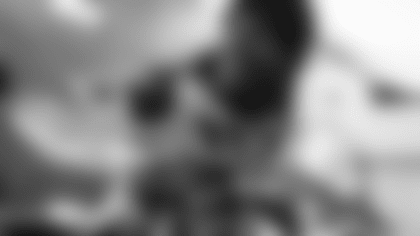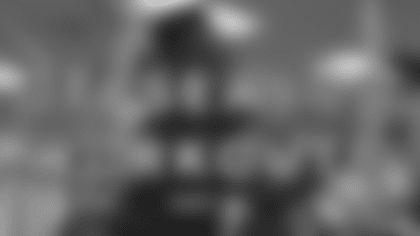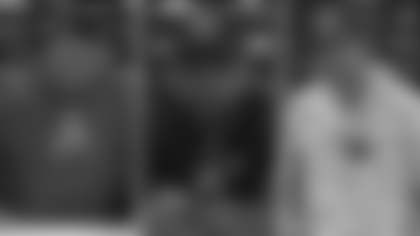NC: Nice of everybody to stick around. Appreciate you guys. I'm sure you guys will be up late. It was a busy day for us, pretty exciting. [We] added four players to the team that we feel will come in and hopefully be able to fill some roles regardless of what they're asked to do. We kicked the night off there with Cyrus [Jones], the first pick there at 60. Kind of had both of those picks actually back-to-back, so we were actually in the process, prepared to pick two players at that time. As we were making the Cyrus pick, we were actually on the phone and consummated the trade with New Orleans. We were able to move back there and gain a fourth round [pick], which gives us an extra pick. Now we have eight picks tomorrow. We'll see how that goes. So, Cyrus - versatile player, played on the perimeter mostly at Alabama, was very effective punt returner, had four punt-return touchdowns his senior season. [He] has really good ball skills, really good with the ball in his hands as a returner, kind of has some position versatility and has additional value on fourth down. And then we moved back there into the third and we picked [Joe] Thuney from North Carolina State. I think the thing about Thuney is his overall versatility. He started at guard. He started at left tackle this past season. Actually, when Dante [Scarnecchia] went down there to work him out, we actually snapped him, worked him at center. Whether he can actually play center is yet to be seen but the overall value he brings in terms of versatility is something that's hard to find. Typically you have guys that can only play one position. They're just a tackle, just a guard or just a center. But here's a player that actually played two different positions. He actually, three if you want to include right and left guard. I'd say he played guard and tackle. Very productive, very durable, very bright. Probably as intelligent as anybody at that position so that was the pick there. Then we were at 91, that was our pick there and we pick [Jacoby] Brissett. The whole quarterback position, we only had two on the team, so we were definitely going to add a third quarterback, no question about it at some point, whether it was in the draft or however we did it. Jacoby was a guy we spent a lot of time with. We brought him in, kind of went through exercises with him. He started his career at Florida then transferred to North Carolina State. Two-year starter in the ACC, big guy, good size, athletic, strong, did a better job of taking care of the football this year, decent touchdown to interception ratio. He played in a couple quality programs. Then the pick there with [Vincent] Valentine. This guy's a big guy. He's long, 6-4 or 6-5, 315, 320 pounds and the thing about him - when you watch Nebraska, you're actually watching he and Maliek Collins, who the Cowboys took there at the top of the third round. You're talking about two NFL defensive tackles. They're a little bit different. Collins is a little bit more undersized, little bit more of a two or three technique. Valentine actually played anywhere from zero all the way out to five techniques. He's primarily an interior defensive tackle, but very strong, very physical, good run player, well-coached, playing for Coach [Bo] Pellini. That program, we have a lot of respect for Coach Pellini, his program and what he did there. Those are the guys we added to the team here this evening. We'll be back at it tomorrow morning and we'll kind of chip away here. We have the pick right now pick in the fourth round. I can't right now really remember the number but we're scheduled to pick in the fourth round right now and we have the end of the draft covered there with the five sixth-round picks, three of which we have to pick. We couldn't trade those even if we wanted to. And then the two seventh-round picks, so we'll see how it goes. I think that puts right now we're actually at 80 players on the roster, just if you include the players we drafted. Somewhere along the line, something's going to have to give. We're going to have to give some picks up or, you know, you have 90 players you can actually have on your roster at one time, so we're going to have to see how it all fits together. So, that's kind of where we are for the time being.
Q: Were there any calls or anything close to materializing during the course of the night to trading up from 60 or 61?
NC: That's something that we explored and it just, let's say it never came to fruition. A lot of that is just the willingness on both teams. We look at everything - going up, going down. We ended up picking, like I said, right there at 60 and then we ended up moving back. We were actually in the process of picking with the 61st pick and then we got the call from New Orleans as we were on the phone and thought it made sense to move back and to get a fourth, so that's why we ended up doing what we did.
Q: I should have asked about last night too. Did you guys ever consider moving up into the first round?
NC: I mean, that's something that was probably a long way to go in order to do that. You have to give up quite a fair amount so I think we went through the process like we normally would. It's good for our whole staff to go through the process and stay up on the trades and what was happening with the draft. In the end, we just felt it didn't make a whole lot of sense and just, there's a lot of capital that would have been involved. So we thought the best thing to do was sit it out and wait until this evening and go to work and do what we needed to do.
Q: Regarding Thuney's versatility: you have players that are versatile and also do one thing. Do you ever say to yourself that you need a guy that can play tackle as opposed to a guy who can go up and down the line?
NC: Sure, I think you have to look at the player and what he actually does well. The guy played left tackle this year at North Carolina State. He had to block guys like [Shaq] Lawson. He had to block some decent players. I think it's a matter of how good they are at the one particular thing. It's like with Nate Solder - you're drafting him as a left tackle whether or not could he play another position? Well, he did his first year, we played him at right tackle because we had [Matt] Light. We ended up playing him at some jumbo tight end, actually. I think you have to look at the player's skill set and then within the context of the rest of your group and how that fits. Some guys are better doing multiple things. Some guys are better playing one spot. Take Matt Light. We tried him at right tackle originally, I wasn't here, and we found out he couldn't play right tackle and his best position was left tackle. You try to figure out, look at the context of your entire line - what do you have? And we work guys in multiple spots and figure out what's their best position in the end? We tried that with Marcus, you know, Cannon - right tackle, left tackle, we tried him at guard. Really his best position is right tackle. He's more of a tackle. I think it depends on the player and the makeup of the rest of your group.
Q: Sometimes is it better to get a guy who is a jack of all trades or master of one?
NC: Right, well I think it's relative to those other players we're talking about. So, if that makes sense.
Q: On taking Cyrus, was he the best player on the board and what was the temptation to consider a running back at 60 or 61?
NC: Yeah, there's a lot of different scenarios that we talk through at the time as we were working across, there were some different players who were graded equally. I think the thing that tipped the scales in Cyrus' favor a little bit was his overall versatility - punt return - that's a huge component of what we do and we thought he had the ability. So, to be a punt returner and to play, we'll see where he can actually play, in terms of corner. He played primarily on the perimeter at Alabama. We'll look at everything and then decide what we feel makes the most sense at this time. So, that's what we did what we did.
Q: How much did Tom Brady's suspension factor into the Brissett pick?
NC: Like I said, we have two quarterbacks on our roster so we knew we were going to add a third quarterback, regardless of whatever the situation was. So, very rarely have we gone through a spring with two quarterbacks. Sometimes we've had three, sometimes we've had four. So, we knew we were going to have a third quarterback on the team regardless. That's always an important position on your team. We felt that it was important for us to have a player that we felt comfortable with. So that's why we picked Brissett.
Q: Do you feel comfortable with your quarterback depth chart for the first four games?
NC: Well, we'll go through the spring. We'll kind of go through the process and see what happens. The only thing we can control really is tomorrow and the draft and then we'll go through OTAs. The rest of it is really out of our hands. We'll control the things that we can control and go through and try to prepare our team the best we can.
Q: With regards to Brissett - was there extra insight into that he played with Charlie Weis at Florida and his work with Bill Parcells and his experience with those two coaches?
NC: Sure, it had been a while since he played with Charlie. Charlie was involved with the recruiting process with him there at Florida. There were a lot of moving parts at the time. Then they made the coaching change, the situation just made the most sense for him to leave. I think having experience with Charlie - we all know how good of a coach Charlie is, how demanding he is and some of those types of things. Whether or not the system was the same - I think it is but it isn't. There's an evolution on both sides of it, so but having experience with Charlie, he could probably take hard coaching. So, that won't be an issue.
Q: What did you think of Kevin Faulk's presentation of the draft pick tonight?
NC: That's why Kevin Faulk is a potential member of the Patriots Hall of Fame. We all love Kevin Faulk. Nobody more than Mr. Kraft, Coach Belichick and I was actually able to develop a real good relationship with Kevin Faulk. Kevin Faulk's one of the best Patriots on a multitude of levels and I think he certainly showed that tonight.
Q: Is there ever any thought put into dealing or acquiring picks based on the fact that you guys can only carry 90 players on the roster?
NC: Yeah, I mean you try to do the best that you can just managing the numbers. Look, if somebody doesn't want - let's say you have extra picks and even if you're trying to get rid of them and somebody doesn't want them - then there's nothing really you can do about it. If you pick the player then there's going to have to be an offset somewhere so if we end up picking, let's just say right now we're at 80 and we pick eight we're at 88 so it leaves us a certain degree of wiggle room. We can still sign some players after the draft potentially, assuming that we keep all of these picks so there might be a trickle-down effect where OK we've added X amount of players and maybe we look at the current roster as constructed and maybe we decide Ok we're going to make a one-for-one swap here so I think once we get through tomorrow we'll kind of have a better sense of where we are numbers wise because technically you can have some extra players until the drafted rookies are technically under contract. So you can maneuver some things around but we'll certainly make sure we're in compliance with everything but we'll do the best we can and just try to manage the numbers the best that we can.
Q: Do you see Joe Thuney as a tackle prospect or will he be playing guard?
NC: We'll see. We'll put him out there. Probably put him inside, put him outside, it might depend on who he's working with, try him with different groups. Maybe you try him at tackle with this group, maybe he works inside with this group so I think Dante does a great job sort of moving those guys around. Ultimately we try to find what they're best position is. Like as an example a guy like Josh Kline, Josh only played guard at Kent State so we brought him here primarily as a guard only but he's been able to kind of develop the center skillset a little bit and you really don't know how that's going to go until you actually have the player here. So is he a one positon player only? Well, we don't really know until you've actually put him in that position. Like [Dan] Koppen was a center only, a really good one. Could he play guard? Well, we may have had better guards so you look at with that player, OK what is he? Is he a one positon player only? OK, then you look at relative to other players at that position. OK, well does this guy maybe have three positon value? So maybe he has a little bit more value than guy that's a one positon player only. I think we'll put them all out there. Like I said, we've played a lot of guys at different spots through the years so once he gets here we'll kind of figure out what he can do. Like I said, the whole center exercise that's just more of a guy like if he can enhance his overall versatility then that was something in the workout to see if a guy can handle a ball, snap the ball. I mean there's some dynamics involved if the guys never snapped. Maybe he can snap, he can handle the ball, he can get the ball up there with pace and he can handle the mental component. Look, it's very rare that a guy can literally play all five positions maybe at a high, high level, but if he plays them at a good level maybe that's good enough relative to the construct of the rest of your team and offensive line.
Q: How important is the level of competition these guys have played against when you are evaluating them?
NC: That's a great question. It's really an important part of the evaluation when you look at, forget about North Carolina State or Thuney in particular, but when you're looking at some of the better players really you want to see them play against the best competition that they can play because inevitably that's what they're going to see on a weekly basis. They're going to have to block Jerry Hughes one week, then they're going to have to block Oliver Vernon and Wake another week, then they're going to have to block Wilkerson, Big M, they're going to have to block guys like that on a consistent basis so you start really with the best player, the best competition that they played against. That's why the Senior Bowl sometimes is a good indicator because that's under the underclassmen that's a big part of it, you're kind of seeing the best players, the best senior players throughout the country so it's a huge part of the overall evaluation because that's who they're going to be playing against. It's one thing if they do it against a lower level team, I mean look, not all teams are created equal. Not all conferences are created equal. That's just a fact. We can't control that. So when you can see them actually play against really good players or good players that are at a comparable level of competition that they're going to see every Sunday, that has to be a part of it, no question.
Q: Were you scouting Thuney and Brissett caught your eye or perhaps vice versa?
NC: Really what we do is, when we go into the overall process we don't start with well we're just looking at this particular guy. You kind of start very broadly. So as an example, with North Carolina State this year, they had a quarterback, they had a center, they had the left tackle, Thuney, they had the tight end, they had a running back so you're watching everybody and you're evaluating everybody and then once you get to a point you say, 'OK we start to maybe focus in a little more on this particular player but you might pay more attention.' Let's say you're watching Thuney and you're trying to really focus on him but the guy that's behind him is handling the ball on every single play so I think you start with everybody and then you start to focus in a little bit more. Maybe you've eliminated one of the other positons. OK we've assigned a grade and we think he's this and then you can spend a little more time and then you can drill down even further. OK, maybe you want to see whatever, all of his attempts or all of this throws in the red areas or all his third down throws. You have the capacity to do that. So we look at everybody. It's the same thing with Alabama. We're not just watching Cyrus [Jones]. You're watching Cyrus, you're watching [Reggie] Ragland, you're watching [D.J.] Pettway, you're watching Jarran Reed. You're watching A'Shawn Robinson. You're watching all those guys and then you have to pull back a little bit and then drill down if you want to watch specifically if you want to watch all the times Cyrus was targeted, all the times the ball was thrown in this direction. With technology you actually have the ability to do that so then you kind of shift your focus into the one particular player so we start kind of with the general overview. We look at everybody and then we kind of hone in a little bit as the process continues further into more and more specific players.
Q: How important was Jacoby Brissett's performance at the Senior Bowl when you were evaluating him?
NC: Yeah, we look at everything. You look at his performances, a two year starter at North Carolina State so he started however many games that was, 30, 20-something, whatever it is. So then you go to the Senior Bowl. It's always good to see them against good players. I'd say the whole thing about the whole East-West, Senior Bowl, combine, in those settings you have to careful to not kind of put too much weight and vice versa because some of these guys haven't played football in a month. So if they have a bad week is that the player? Is that really what he is or there's some other components that are involved so you kind of have to go through the process and you have to be careful I'd say of overvalue or undervaluing just based on what the guy does. OK, well the guy threw a horrendous ball in one-on-one period. Does that mean he's no good? No, I mean so there's a lot of factors that go into it. Like I said we talked about this last week during the pre-draft press conference. We start, our area scouts are actually - they're watching the guys for the 2017 Draft as we speak. That's what they're here doing. Then we're going to go through the spring, we'll go through the fall, we'll evaluate them, and then we'll go through the whole All-Star. Its honesty a 365 beginning to end and you're just trying to get to a point to where you feel comfortable. I mean look, the reality is you're going to eliminate a lot of players along the way and we're going to only have X amount of players you're going to consider drafting. So of the thousands of guys that we evaluate in the fall, we'll end up with however many players are considered draftable for us, regardless of the round and then we'll continue to drill down even further.
Q: Would you like to dial back some of the punt return responsibilities from guys on your roster in order to give Cyrus Jones a look at that role?
NC: Yeah, the guys that have done it have been really good. I mean Danny was one of the league leaders last year. Julian who had never done it before, his average is like one of the top punt returners in history. That's a hard I would say skill and position to develop so if you have multiple players that can actually handle the ball then you can figure out OK well maybe we can take his workload and redistribute it somewhere else. In the end we're going to do what we think is best for the football team. If a guy snot ready to do it then we're not going to have him do it even if he has the experience and he's done it. We're not going to really know. Look, it's the same thing. These guys are all starting from a blank slate. Like everything they've done to this point like honestly doesn't matter so now they're going to show up here next week and basically start from scratch. There's probably going to be some things that Joe and Bubba will coach them to do in terms of fielding the ball, handling the ball, may be a little bit different. OK, how do they handle that? How do they read the ball? Can they adjust to our blocking pattern? So there's a whole number of things that go into it and then he's trying to learn a new position so it's just a matter of how quickly they can perform the task at a good level relative to another player at that same positon and then ultimately we'll figure out whoever's the best option for us and however we think is the best at that time then we'll go ahead with him in that capacity.
Q: When you're evaluating a defense as talented as Alabama's, is it difficult to differentiate between who is really good and who perhaps is being boosted by those around him?
NC: Sure, that's a good question. You really have to go back, like the question earlier, you're kind of looking at everybody and then you really almost have to go one by one by one and look at the actual players skill set relative to what they're actually asked to do and then kind of project that a little bit in terms of what we would ask them to do. Having a lot of good players is good. Look, Coach Saban's got a great program and their track record speaks for themselves so yeah, you can never have enough good players but how good is good? Some good is better than others so you really have to spend time on - I know that's probably a great quote - but you really have to spend time on it and look at the induvial player and what he actually does and how effectively he does it and then go from there.
Q: Do you feel that you've brought in guys that check off the certain physical traits you are looking for and do they also meet your criteria as far as the mental makeup characteristics that you look for in a player?
NC: It's everything. I mean it really is. We try to look each positon on the board, each positon they have their own particular factors and positon skill set that we evaluate and we go through and we assign a grade and OK there's certain things that a corner's going to have to be able to do. There are certain things that a tight ends going to have to be able to do. Everyone has their own particular skills that they're going to have to do. So, OK, will he check every box? Well maybe not but does he check enough? And really the most important thing is to take the strengths of a player and try to put him into positon to where he can utilize those strengths. Not 'well he doesn't do this'. Then we won't put him in that positon hopefully. So [we] try to identify what the skill is, how well they do it, and then put them in a positon where they can actually see it so there's the physical component and then overall, call it football makeup component, is a central part of it as well. Look, we're not perfect. Some players work the way we think. It comes with the territory but you're trying to create a profile of the player within our building and then how he's going to handle everything that comes along with being a New England Patriot. Being in the program, the demands that we place on those players, so you factor everything in and some players they may check every single place both from a physical standpoint and form a football makeup standpoint and you have others that maybe they check enough of them and then you feel comfortable about that level. So those are decisions that we ultimately have to make so the most important thing is finding players that we feel fit the New England Patriots and however they end up getting here, then they get here, but the bottom-line is that's the most important players is give me players that we feel fit our program and what we're looking for on a multitude of levels.



